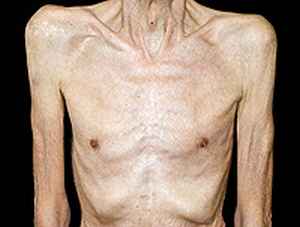

MedFriendly®


Cachexia
Cachexia is the appearance of serious illness, poor
nutrition, weakness/fatigue (to the point of being
immobile), massive weight loss, and wasting away
(e.g., loss of muscle mass), usually due to severe
starvation, a severe emotional disorder, or a serious
long-term and/or reoccurring disease, such as the end
stages of cancer (in which it is known as cancer
cachexia). Cancer is a group of diseases in which
symptoms are due to an abnormal and excessive
growth of cells in one of the body organs or tissues.
Cachexia can also occur in certain drug addictions.
A person with cahcexia.
FEATURED BOOK: Cancer Cachexia
Cachexia is also known to occur after certain infectious diseases, multiple sclerosis, and
during congestive heart failure. Multiple sclerosis is a condition in which multiple areas of
abnormal patches (known as plaques) develop in the brain and/or spinal cord (depending
on the stage of the illness).Congestive heart failure is an imbalance in the pumping action
of the heart that causes inadequate blood circulation.
In cachexia, the person is not trying to lose weight. In fact, if a person with cachexia tries
to gain weight, muscle mass will still be lost due to the disease process in place. If a
person has cachexia, response to standard medical treatment is poor and their chance of
dying is significantly increased. Cachexia is also known as cachexy, cachectic
syndrome, and wasting syndrome. Cachexia comes from the Greek word "kakos"
meaning "bad," and the Greek word "hexis" meaning "state." Put the two words together
and you have "bad state."
"Where Medical Information is Easy to Understand"™















